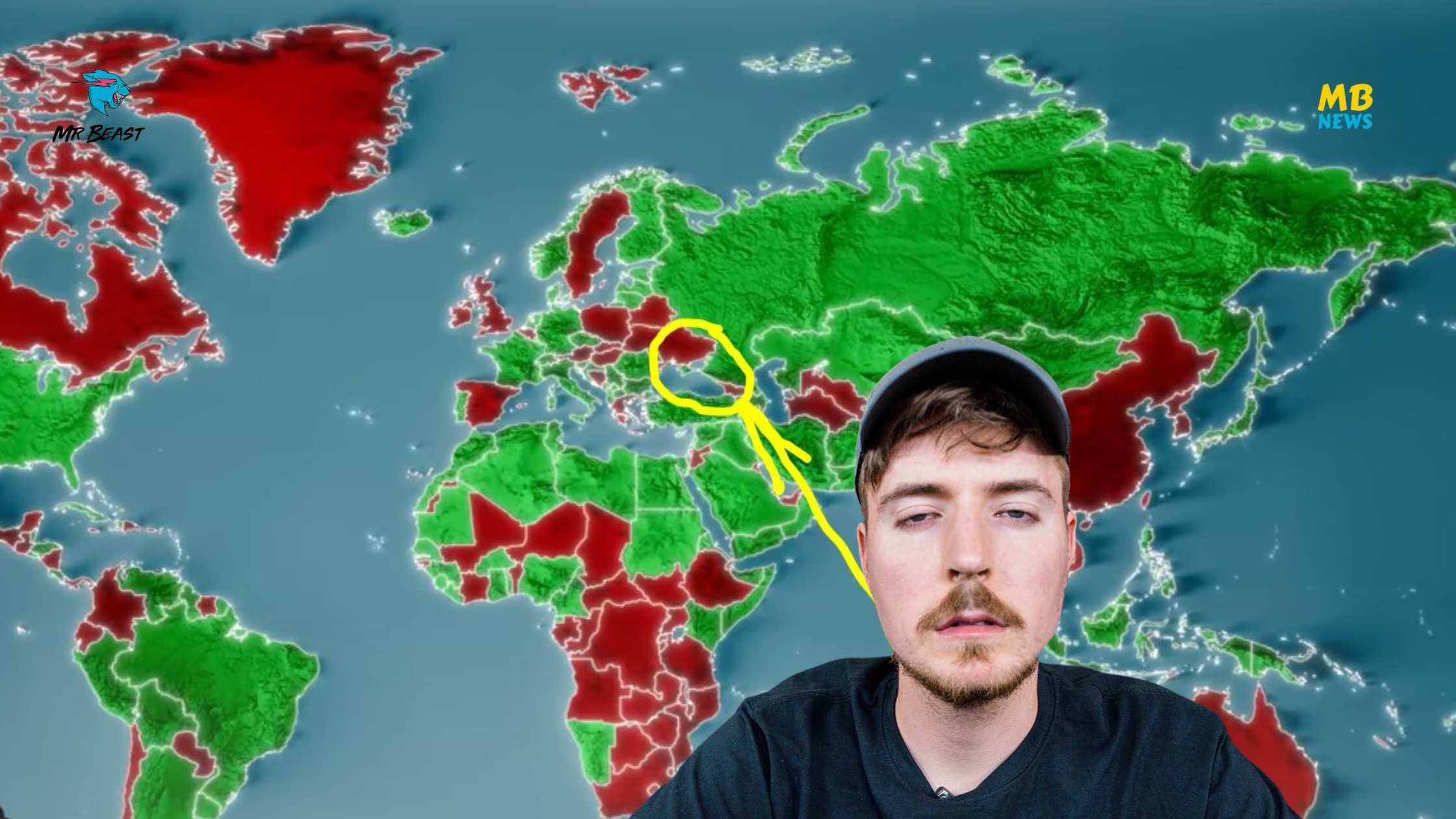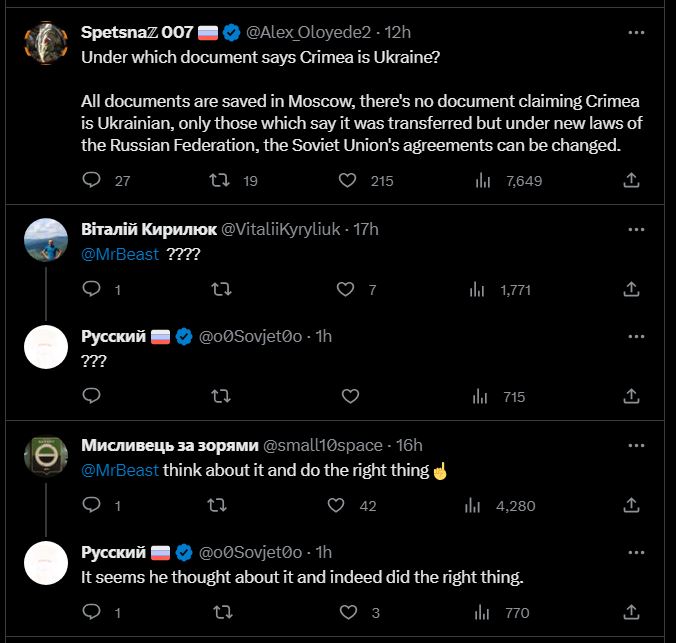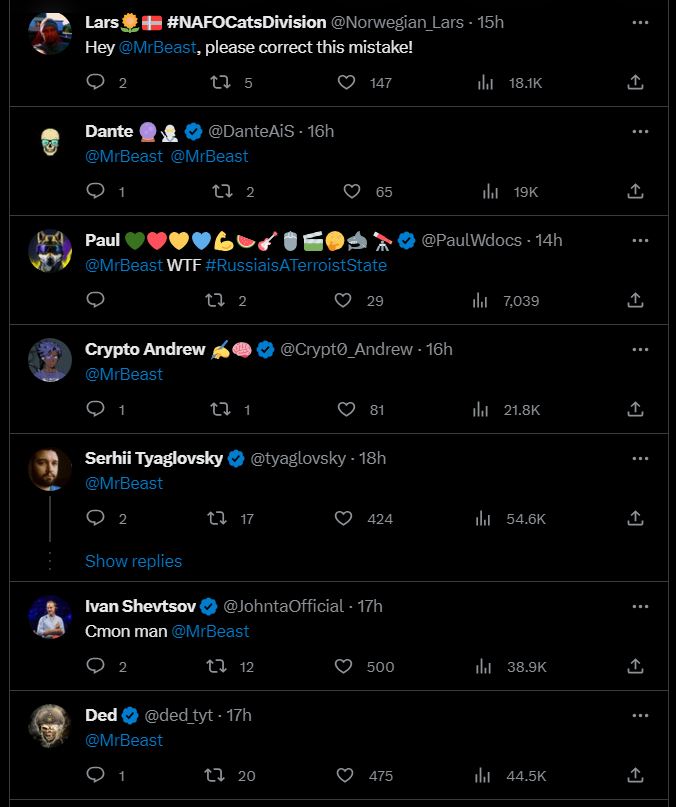Engaging Debate: Views Clash Over Crimea Representation in Recent MrBeast Video

In the age of social media and viral content, public figures often find themselves under intense scrutiny. The recent reaction to a video by popular content creator MrBeast has illuminated the contentious landscape of cancel culture, where opinions on a creator’s actions can vary widely and emotions can run high.
The release of MrBeast’s video “Every Country On Earth Fights For $250,000” has sparked a dispute. The video displays Crimea as part of Russia on a map, prompting differing opinions.
Some viewers claim that Crimea belongs to Ukraine and insist on revising the video’s maps. This disagreement has triggered a fervent discussion about the portrayal of geopolitical issues in media content.
A perceptive viewer’s observation about the video’s representation of Crimea as part of Russia has led to a cascade of responses, many of which reflect the polarized nature of modern discourse. Among the responses, a significant portion has taken a critical stance, accusing the portrayal of Crimea as inadvertently endorsing the contentious annexation by Russia in 2014.
The controversy extends to the inclusion of a Russian representative in the competition. With ongoing tensions between Russia and Ukraine, the discrepancy between international sports protocols and media representation has not gone unnoticed.
Adding urgency to the conversation are the recent tragic incidents involving Ukraine and Russia. The missile strikes that have impacted Ukrainian cities underscore the human toll of geopolitical conflicts, casting a somber light on the broader discourse.

However, what is perhaps most noteworthy in this situation is the way it has been co-opted into the broader cancel culture narrative. Cancel culture, characterized by swift and often widespread condemnation of individuals or entities, has become a forceful tool for expressing discontent in the digital age. Some individuals, in the midst of this ongoing debate, seem to be using the situation as an opportunity to amplify calls for canceling MrBeast.
Amidst the voices of critique, there are those expressing gratitude for what they perceive as support for Ukraine.
These individuals interpret the discussion as a sign of solidarity in the face of conflict, recognizing media’s power to raise awareness and foster empathy.
Notably, the demand for change has taken the form of a call to modify the map in MrBeast’s latest video. This collective request underlines the impact of audience feedback in shaping content. It illustrates the reciprocal relationship between creators and their followers, where content evolves through a dynamic interaction.
This incident stands as a testament to the dynamic nature of media’s influence. While some view it as a call to action, others consider it a platform for cross-cultural understanding. It highlights the inherent tension between entertainment and geopolitical representation, prompting us to question the balance between these seemingly disparate realms.

Ultimately, the media’s role in global conversations cannot be understated. It serves as a mirror that reflects our values, biases, and perceptions. The myriad reactions arising from this incident underscore the complexities of representation, and the responsibility creators bear when their content enters the international stage.
While cancel culture is often driven by concerns about accountability and justice, it can sometimes veer into excessive negativity and a lack of nuanced understanding. What was originally a discussion about geopolitical representation has morphed into a larger debate about whether a public figure should be ‘canceled’ for perceived missteps.
It’s important to note that the complexity of media representation is not a black-and-white issue. Creators, including MrBeast, often have wide-ranging audiences with diverse backgrounds and viewpoints. In this light, crafting content that pleases everyone while remaining politically neutral can be a near-impossible task.
While some critics are adamant about canceling MrBeast, it’s equally important to remember that nuanced conversations can foster positive change more effectively. Rather than pushing for outright cancelation, discussions that highlight concerns, engage with the creator’s intentions, and encourage growth have the potential to be more constructive.
In the end, the case of MrBeast serves as a microcosm of the complexities surrounding modern media consumption and response. Cancel culture’s rise has brought to the forefront the power of collective action in holding figures accountable, but it also raises questions about whether this approach always leads to productive outcomes.
As discussions unfold, one thing is clear: the landscape of media engagement is evolving rapidly. The incident highlights the need for careful consideration, respectful discourse, and a balanced perspective, both from content creators and the audiences they serve. In the end, the goal should be not only to hold creators accountable but to foster understanding and growth in an increasingly interconnected world.
Introducing the ultimate hub for MrBeast fans and burger enthusiasts! Discover the latest news, updates, and behind-the-scenes insights into MrBeast’s world-famous burger chain on this dedicated website. As a fellow fan, I’ve personally tried and tested a variety of MrBeast burgers, from the classic Chris burger to the irresistible Smash burger. Join me in this culinary journey and stay informed about new menu items and charity campaigns.
Don’t miss out on the opportunity to satisfy your taste buds—bookmark this website and get ready for a burger experience like no other! If you have any complaints regarding my content or news, please email me @ mbeastnews@gmail.com
Thanks and Regards
Bobby








